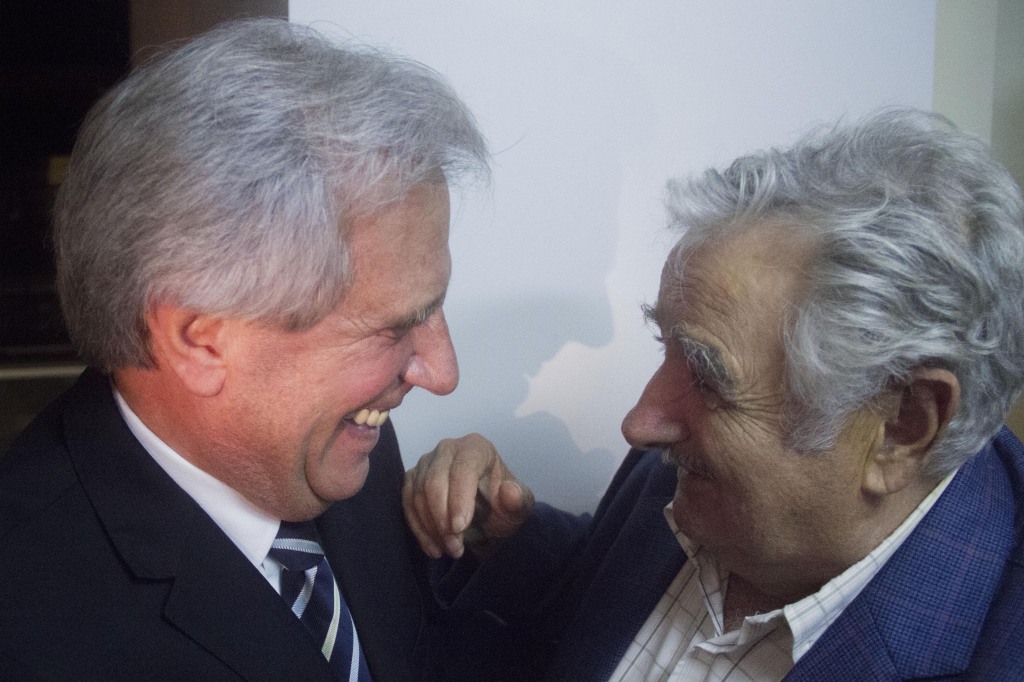
Former president and now president-elect Tabaré Vázquez and current head of state José ‘Pepe’ Mujica meet at a hotel in Montevideo on Sunday night, after Vázquez won Uruguay’s run-off vote, beating rival Luis Lacalle Pou by a considerable margin.
New president-elect will have freedom to choose own path, says current head of state, after Broad Front’s decisive victory in run-off
MONTEVIDEO — New president-elect Tabaré Vázquez will be free to choose his own political path, José “Pepe” Mujica said yesterday, as Uruguay’s popular current head of state promised not to ask for any favours from his predecessor, and soon-to-be successor.
On Sunday night, Vázquez, who served as president from 2005-2010, scored an overwhelming victory in Argentina’s neighbouring country, extending the Broad Front’s 10-year control of the presidency.
After final results were tallied overnight, the statistics spoke for themselves. Despite awful weather conditions and rain by the bucketload, turnout in Uruguay was 88.57 percent for the runoff, reported Uruguay’s Electoral Council.
A final count of ballots put Vázquez on 53.6 percent, meaning he received nearly 300,000 votes more than his rival, Luis Lacalle Pou of the National Party, who scored 41.1 percent. That margin is considerable, considering the total electorate was around 2.6 million of Uruguay’s 3.5-million population.
An unofficial tally from the Electoral Council revealed the Broad Front ‘s dominance even further. The coalition won in 12 of the country’s departments, taking all but one of those on the outer rim of the country, compared to the seven, mostly interior departments taken by the opposition National Party.
In Salto, the country’s second-highest populated area, the president scored his largest victory, taking over 58 percent of the vote; Montevideo followed closely behind, where the Broad Front took 57.6 percent of the vote. Projections showed the coalition had also won in Artigas, Canelones, Cerro Largo, Colonia, Paysandú, Río Negro, Rivera, Rocha, San José and Soriano. Another department, Florida, may also follow, potentially bringing the total to 13, with early projections putting Lacalle Pou’s party just 448 votes ahead in the region, with around 2,000 votes still yet to be tallied. The National’s strongest performance was in Tacuarembó, where they scored just under 50 percent.
Vázquez’s attention will now turn to governing, with the make-up of the new Cabinet the key question on everyone’s lips. While some names have been put forward, such as Daniel Astori for Economy Minister, many positions remain up in the air.
“If there’s somebody who won’t ask for anything, it’s me. I’ve had the experience of being president and it really annoyed me when people would demand something in exchange.”
‘A fluid transition’
The current president, whose larger-than-life personality has dominated both internal and external perceptions of Uruguay’s politics, vowed yesterday that he would not interfere — Mujica said yesterday he won’t even ask Vázquez “for the portero (doorman position).”
“If there’s somebody who won’t ask for anything, it’s me. I’ve had the experience of being president and it really annoyed me when people would demand something in exchange” (for their support or help).
He also considered that it is crucial to give the new president “the maximum amount of freedom and guarantees so that he can carry out a fluid transition.”
“We won’t think twice about telling him that he has our support or when we need to give him a different perspective,” Mujica said.
The president said he will be a “strong lawmaker” but admitted however he is aware of his political clout. “People show it to me when I walk down the street,” he said but underlined that his power is not “a gift from God.” It is the result of “years of political activism,” he declared.
Mujica is certainly influential — he will likely leave office with record approval ratings.
Vázquez has promised inclusive governance, saying Sunday night: “I promise to work my utmost but I cannot, should not and do not want to work alone, I want to count on all Uruguayans.”
Though Vázquez is expected to name his Cabinet this week and despite a brief encounter with the president at a hotel in Montevideo on Sunday night, he will not meet with Mujica for at least the next 10 days, First Lady and Senator Lucia Topolansky revealed yesterday.
The current president will today travel to Guayaquil in Ecuador for a Unasur summit, where Uruguay will receive the pro-tempore presidency. He will then travel onto Quito and finally, Veracruz, in Mexico.
‘Vibrant relationship’
After a wave of congratulatory remarks arrived in Montevideo from across Latin America the previous night, US Secretary of State John Kerry yesterday paid tribute to Uruguay’s political class and the “vibrant relationship” Washington holds with the South American country.
“We hope to work with the elected President Vázquez and his government to advance our bilateral relationship,” Kerry said in a statement. “Our cooperation and long-standing commitment to Uruguay and the Uruguayan people will continue to thrive with the new government.”
The Secretary-General of the Organization of American States (OAS) José Miguel Insulza also paid tribute to the high turn-out of voters, high level of political debate during the campaign and the “constructive spirit” of Uruguay’s political parties.
But despite the goodwill between the two leaders, there are potentially some sticking-points. One is the controversial marijuana legislation, introduced by Mujica, which has captured the world’s attention.
Vázquez has indicated that he will keep the law, but he is clearly less enthusiastic about it. He has said he may alter facets of it, depending on its impact on society. One sticking-point thus far has been the proposed sale of marijuana through pharamacies, which Vázquez considers inappropriate.
Vázquez now has three months to sort out his team and his priorities before starting his term on March 1 — for his part, the president-elect has promised to focus on crime and education.
Originally published in the Buenos Aires Herald, on Tuesday, December 2, 2014
